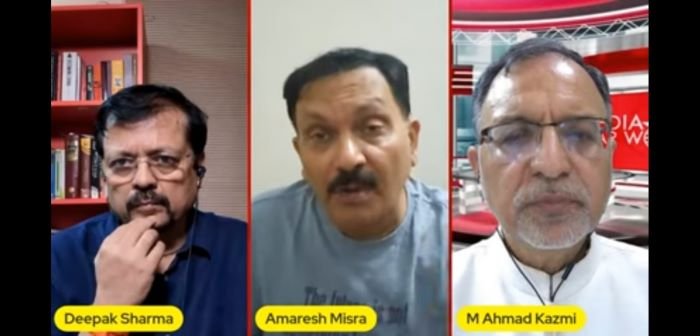
By Mohammad Tarique Saleem
The recent Iranian missile strike on a U.S. military base in Qatar has ignited a sharp debate among regional analysts and security experts. At the heart of the discourse are three distinct perspectives those of Deepak Sharma, Amaresh Mishra, and Mohammad Ahmad Kazmi each offering a unique lens on the strategic implications of Tehran’s action. While Sharma warns against overreaction and urges calculated restraint to avoid dragging Gulf allies into broader conflict, Mishra views the strike as a direct provocation demanding decisive deterrence. Kazmi, meanwhile, highlights the underlying geopolitical shifts, calling for diplomatic engagement and regional de-escalation. Together, their views capture the dilemma confronting Washington and its Gulf partners: how to respond with strength without triggering a larger, destabilizing war.
Deepak Sharma, a security strategist and former diplomat, approached the incident from a realist lens. He opened the discussion by acknowledging Iran’s heightened military provocations across the Middle East, but emphasized the need to avoid overreaction: “Yes, the strike is provocative but it’s part of Tehran’s asymmetric toolkit, aimed at coercing Washington without sparking full‑scale war.”Sharma cautioned against fomenting escalation. He warned against excessive military responses especially from the U.S. or GCC partners like Qatar that could backfire.
Instead, he argued, the American base in Qatar has become a delicate “tripwire” in wider U.S. Iran tensions. Any rash counterstrike risks dragging Gulf allies into a broader conflict.On the strategic implications, Sharma assessed Iran’s message: it’s a warning shot to both Washington and its regional allies. Tehran intends to project influence without crossing redlines. Senior U.S. officials, he noted, will now face intense pressure to craft a response that upholds deterrence but avoids open confrontation—leaning toward tightened sanctions or cyber-retaliation.
Amaresh Mishra, a policy researcher with ties to think tanks focused on Gulf security, took a more alarmist stance. He described the attack as “a direct challenge to U.S. credibility and GCC stability.” Mishra warned that unless decisively rebuked, Iran might feel emboldened to strike again. Mishra urged Qatar and the U.S. to coordinate a multi-faceted response. He proposed joint patrols, increased deployment of advanced air defense systems in Qatar, and deeper intelligence-sharing across GCC nations.
He suggested that Gulf countries need to move beyond silent condemnation and show tangible defensive unity. Highlighting broader strategic trends, Mishra pointed to Iran’s expanding activity in the Red Sea, Iraq, and Syria. He portrayed Iran’s tactics as elements of a larger “expansionist doctrine” calibrated to pressure the West. For Mishra, region-wide diplomatic and military reinforcement is now essential to deter future aggression.
Mohammad Ahmad Kazmi, an independent journalist covering international affairs, offered a more nuanced viewpoint rooted in regional dynamics. Kazmi emphasized Iran’s security calculus: feeling threatened by U.S. troop withdrawal from the region, especially in Iraq and Afghanistan, Tehran might see the Qatar base as a strategic vulnerability that needs testing. He expressed concern that a heavy-handed U.S. response could fragment Gulf unity. Since the 2021 U.S. exit from Afghanistan, Gulf relationships with Washington have been under revision. A limited tit-for-tat may serve American interests, but a large-scale strike could fracture alliances especially with nations pursuing cautious ties between Iran and the U.S. Kazmi called for “calibrated diplomacy and multilateral engagement.” He recommended U.S. backing for renewed nuclear talks with Iran, along with regional confidence-building measures involving GCC partners. His key plea was for restraint: avoiding a path that leads inexorably toward major war.
Comparative Analysis: A Spectrum of Views
Responding with strength vs. restraint : Mishra champions a strong defensive posture and visible deterrence. Sharma counsels prudence to prevent unintended escalation. Kazmi advocates combining limited military steps with robust diplomacy.
Nature of the Qatari base : All three emphasize Qatar’s geopolitical weight. Mishra views the base as vital meriting a hard response. Sharma warns that military action on Qatari soil could embroil vulnerable Gulf states. Kazmi underscores Qatar’s complex position, balancing ties with both Iran and the U.S.
Iran’s motivations : Sharma frames the strike as strategic signaling. Mishra views it as tangible aggression rooted in ideological expansion. Kazmi believes Iran is reacting to reduced U.S. presence and testing Gulf resolve.
Implications for Policy
For the U.S. and Gulf allies : The debate spotlights a critical tension: how to deter Iran effectively without triggering wider war. Military assurances, defensive coordination, and crisis diplomacy are all on the table.
For Qatar : As host of U.S. forces, Qatar must balance alliance commitments with complex regional diplomacy. Its ability to escalate or de-escalate tensions may shape Gulf security dynamics.
Broader Gulf outlook : The incident underscores the shifting sands of Gulf geopolitics where the U.S., Iran, and GCC states navigate post-U.S. withdrawal anxieties, rising regional assertiveness, and evolving alliance configurations.
Between Deterrence and Diplomacy : The exchange among Sharma, Mishra, and Kazmi highlights a fundamental challenge in Gulf security: balancing military deterrence with diplomatic maneuvering. Iran’s missile strike on the Qatar base may have been tactical, but its reverberations are strategic. Mishra’s call for firm action reflects alarm at diminishing deterrence. Sharma’s caution reminds policymakers of escalation’s risks. Kazmi’s layered approach stresses engaging Iran diplomatically while preserving Gulf cohesion. As tensions simmer, Gulf leaders alongside Washington face a pivotal test. Will they tighten security through force, or build resilience through dialogue? The answer will shape the future of regional stability and international order.









